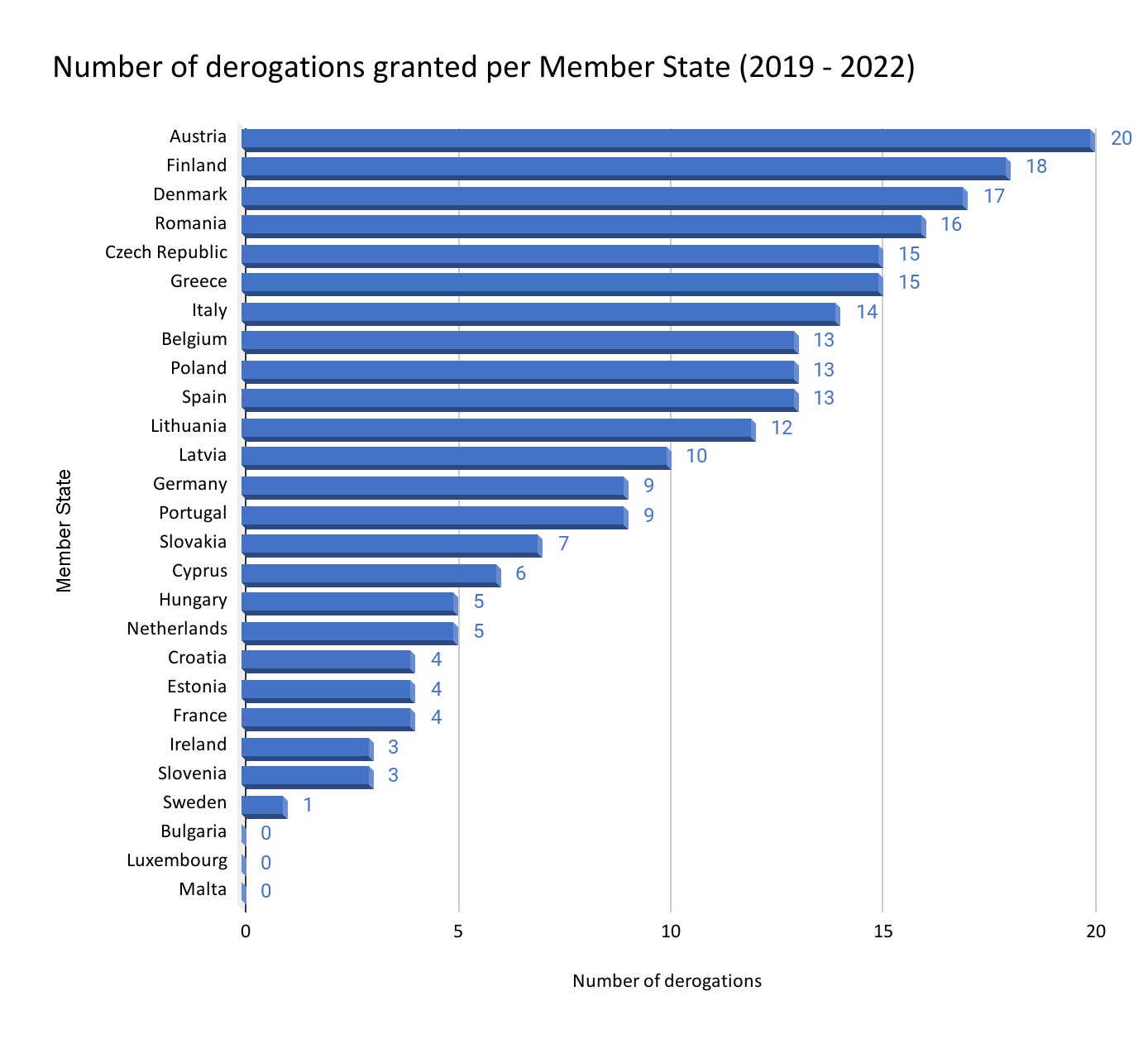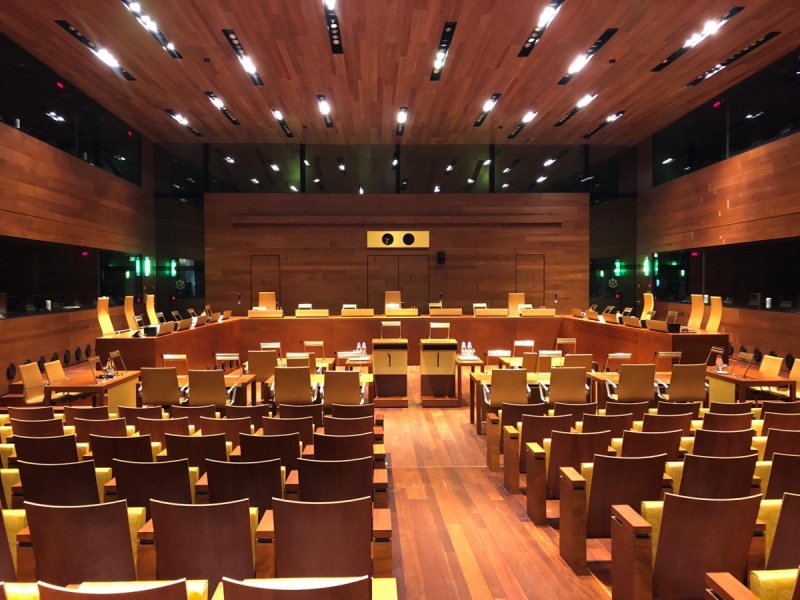We urge the European Commission and EU Member States to end all emergency pesticide derogations right now. This should be the result of a recent groundbreaking ruling by the European Court of Justice. But we already see attempts to limit the reach of this ruling and to delay the implementation. So we wrote the Commission and countries to act now.
If a pesticide is banned by the EU because there is overwhelming evidence of the harm and danger, you would expect it not to be sprayed into the environment anymore. So why are many banned pesticides still widely used and allowed in many EU countries? Actually, Member States use a legal loophole for ‘emergency authorisations’. These so-called derogations should be an exception, only to be used on special occasions under unforeseen circumstances, like a major exotic pest attack. Reality is quite different, as we identified 236 derogations given to 14 very dangerous pesticides by EU Member States in the last 4 years. But now the European Court of Justice made an end to this abuse in a groundbreaking ruling issued on January 19th. However, both the EU Commission and some EU Member States are slow to react. This would allow the unlawful abuse to continue for this year and even after that. This would not only be against the law but also very bad for health and environment. So we have now asked the EU Commission to take swift action and ban all emergency authorisations for EU-banned pesticides, right now!
The court case: David against Goliath?
In 2019, Nature & Progrès Belgium, a Belgian individual beekeeper and PAN Europe asked the Belgian Administrative Court to withdraw a derogation given to the sugar industry for the use of bee-toxic neonicotinoid insecticides on sugar beets. We asked the Belgian Court to submit questions to the European Court to clarify the limits of the law with regards to derogations. In the hearing in the European Court, the Belgian State and the Sugar Industry were joined by the European Commission and the states of Finland, France, Greece and Hungary and pesticide companies. In vain, because on the 19th of January 2023 the ECJ published a ruling that clarifies the use and limitations of derogations.
Widespread abuse of ‘emergency authorisations’
To explain the extent of the abuse of the derogation system, we analysed the emergency authorisations for 24 pesticide active substances from 2019 to 2022. These pesticides have been either proven to be highly toxic for human health and the environment and have consequently been banned in the EU. Out of the 24 investigated banned pesticide substances, a total of 236 emergency authorisations were granted for 14 substances between 2019 and 2022. Not all countries use derogation: Austria is the top user with 20, Finland comes second and Denmark third, while Luxembourg, Bulgaria or Malta give none for the substances we looked into.
Very clear and fundamental ruling by the European Court
The opinion is much more fundamental than just derogations for neonicotinoid-seed treatment provided to sugar beet. It concerns all derogations given to EU-banned pesticides. The Court explained that giving a derogation to an EU-banned pesticide would mean giving priority to plant production over human health and the environment. This is not allowed by EU law.
The Court reiterated “the obligation on the Member States (…..) to take all necessary measures to promote low pesticide-input pest management, giving wherever possible priority to non-chemical methods.” (consideration 44).
“Such prohibitions thus meet the objective of Regulation No 1107/2009 which is (….) in particular to ensure a high level of protection of human and animal health and the environment.” (46)
“In that regard, it should be borne in mind that those provisions are based on the precautionary principle, which is one of the bases of the policy of a high level of protection pursued by the European Union in the field of the environment, (…) in order to prevent active substances or products placed on the market from harming human or animal health or the environment.” (47)
“Furthermore, it is clear (….) that the provisions governing authorisations must ensure a high standard of protection and that, in particular, when granting authorisations of plant protection products, the objective of protecting human and animal health and the environment should ‘take priority’ over the objective of improving plant production.” (48)
These considerations are very clear. They basically mean that all pesticide derogations must end, for none of them is for a real emergency. To make sure there is no delay in implementing the Court ruling, PAN Europe asked the EU commission to take the necessary steps and make sure that all pesticide derogations will be annulled right away.
End to export of seeds treated with neonicotinoid pesticides
The Court also clarifies in consideration 53 that the use of EU-banned pesticides in order to treat seeds is illegal. The Court does not differentiate whether the treated seeds will then be used in the EU or in Third Countries. This means that seeds cannot be treated with an EU-banned pesticide, not for use in the EU nor for export. This will lead to improvements in the environment and health from Third countries as well.
Disastrous handling of derogation file by EU Commission
In the letter we also expose that the EU Commission and especially DG Sante has really mishandled this file. "This ruling is the consequence of a disastrous handling of this file by your services over the last 15 years."
Hans Muilerman, chemical officer at PAN Europe said: "PAN Europe has been fighting this maladministration for many years. This landmark ruling of the EU Court puts an end to 10 years of abuse by Member States, with the blessing of the European Commission. Thanks to our action, the EU environment will become a safer place."
Letters to national governments to stop derogations for non-authorised pesticides now
PAN Europe and Nature & Progrès Belgium have also written to the Belgian minister of agriculture Clarinval to immediately withdraw the authorisations for ‘emergency use’ of the insecticide indoxacarb (banned in 2021) and the two top bee-killers thiamethoxam (CRUISER 600 FS) and imidacloprid (GAUCHO 70 FS) that received derogations for use from 15/11/2022 till 14/03/2023.
With our members we are preparing letters to other EU countries that have already authorised the use of neonicotinoid seeds for use in 2023.
Hidden derogations
So far we have only found 5 pesticide derogations for 2023. These are Thiamethoxam granted in the Czech Republic, Slovakia and Finland, Beta-Cyfluthrin and Clothianidin in Czech Republic, and Indoxacarb granted in Belgium.
However, in our earlier research we also noticed that some countries only report derogations later or even after the use is ended. Belgium has published the emergency derogation for Indoxacarb on their national website, but the data are not available in the European Commission’s register of the emergency authorisations.
In the case of Spain, Notification of an Emergency Authorisation ES-ES-2019-17, issued for the period 01/01/2019 - 15/04/2019 was published on 9 December 2019. That is 8 months after the end date. So we can not know for sure which derogations are given for 2023 at this point. We urgently ask the EU Commission to produce an updated overview. Together with our members we also encourage all national parliaments to make sure they get the actual information.
- PAN Europe letter to the European Commission
- PAN Europe and Nature & Progrès Belgium letter to the Belgian minister of agriculture Clarinval
- Banned Pesticides Still Widely Used
- Ruling 19 January 2023 by the European Court of Justice (in EN, click at top for any EU language)

